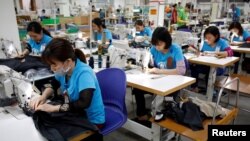ໃນຂະນະທີ່ມີຄວາມເປັນຫ່ວງກັນຫລາຍຂຶ້ນ ໃນເລື້ອງຄວາມປອດໄພຂອງອາຫານຢູ່ໃນຫວຽດນາມ, ຄະນະຜູ້ແທນທີ່ນຳພາໂດຍລັດຖະບານສະຫະລັດ ໄດ້ສິ້ນສຸດການຢ້ຽມຢາມປະເທດແຫ່ງນັ້ນລົງໃນວັນສຸກມື້ນີ້ ທີ່ແນໃສ່ເພີ້ມການຂາຍສິນຄ້າຂອງອາເມຣິກັນຢູ່ໃນຫວຽດນາມນັ້ນ.
ຄະນະຜູ້ແທນດັ່ງກ່າວໄດ້ໄປຢ້ຽມຢາມນະຄອນໂຮ່ຈີ້ມິງ, ແລະຮາໂນ່ຍ ເພື່ອສົ່ງສັນຍານໃຫ້ຮູ້ວ່າ ເຖິງແມ່ນສະຫະລັດຈະໃຫ້ຄວາມສຳຄັນແກ່ການຄ້າຂອງຫວຽດນາມກໍຕາມ ແຕ່ວ່າຕະຫລາດແຫ່ງນັ້ນ ກໍບໍ່ໄດ້ເປີດກວ້າງຢ່າງພຽງພໍ.
"ປະຊາຊົນຂອງພວກເຮົາໄດ້ເຫັນວ່າມີໂອກາດດີຫລາຍທີ່ຈະທຳການຄ້າຂາຍກັບຫວຽດນາມ ແລະເຊັ່ນດຽວກັນ ພວກເຮົາກໍໄດ້ເຫັນວ່າ ຫວຽດນາມມີໂອກາດດີຫລາຍທີ່ຈະທຳການຄ້າຂາຍກັບສະຫະລັດ," ນັ້ນຄືຄຳເວົ້າຂອງທ່ານ ເທັດ ແມັກຄິນນີ (Ted McKinney), ລັດຖະມົນຕີຊ່ວຍວ່າການກະຊວງກະສິກຳ ຂອງ ສະຫະລັດ ຮັບຜິດຊອບດ້ານວຽກງານການຄ້າ ແລະກະສິກຳກັບຕ່າງປະເທດ. ທ່ານກ່າວຕໍ່ໄປວ່າ "ຫວຽດນາມໄດ້ສະແດງໃຫ້ເຫັນວ່າ ຕົນເອງເປັນຄູ່ພາຄີທາງການຄ້າທີ່ດີຢ້ຽມ ຕໍ່ສິນຄ້າສະຫະລັດທຸກຢ່າງເລີຍ.”
ແຕ່ວ່າ ມັນກໍບໍ່ໄດ້ດີຢ້ຽມໄປໝົດດອກ. ທ່ານໄດ້ກ່າວລຶ້ມຄືນຄຳຕຳໜິຂອງປະທານາທິບໍດີສະຫະລັດ, ທ່ານດໍໂນລ ທຣຳ ທີ່ເວົ້າວ່າ ການຂາດດຸນການຄ້າກັບຫວຽດນາມແມ່ນສູງເກີນໄປ. ທ່ານເວົ້າຕື່ມວ່າ, ສະນັ້ນຫວຽດນາມຕ້ອງໄດ້ຊື້ສິນຄ້າຂອງອາເມຣິກັນເພີ້ມຂຶ້ນອີກ.
ທ່ານເວົ້າວ່າ "ທ່ານຂາຍໃຫ້ພວກເຮົາຫລາຍກວ່າພວກເຮົາຂາຍໃຫ້ທ່ານນັ້ນຫລາຍ."
ຫວຽດນາມໄດ້ສົ່ງອອກສິນຄ້າ ແລະການບໍລິການມາຍັງສະຫະລັດ ໃນມູນຄ່າ 44 ຕື້ ໂດລາ ແຕ່ເດືອນມັງກອນຫາເດືອນກໍລະກົດປີນີ້ ໃນຂະນະທີ່ໄດ້ນຳເຂົ້າສິນຄ້າ ແລະບໍລິການຈາກສະຫະລັດໃນມູນຄ່າ 10 ຕື້ໂດລາ, ອີງຕາມພະແນກພາສີຂອງຫວຽດນາມ.
ອ່ານຂ່າວນີ້ເພີ້ມເປັນພາສາອັງກິດຢູ່ລຸ່ມນີ້
As concerns grow in Vietnam about sanitary food, a U.S. government-led delegation is completing a visit here, ending Friday, aimed at increasing sales of American farm products in Vietnam.
The delegation has been visiting Ho Chi Minh City and Hanoi to send the message that while the U.S. values Vietnam trade the market is not open enough.
"Our people see great opportunity to do more business with Vietnam and likewise we see great opportunity for Vietnam to do business with the U.S.," Ted McKinney, U.S. undersecretary of agriculture for trade and foreign agricultural affairs said at a press conference. "Vietnam is proving itself as a terrific trading partner across all U.S. products," he added
Not completely terrific, however. He repeated U.S. President Donald Trump's complaint that the U.S. trade deficit with Vietnam is too high, so Vietnamese need to buy more American, he said.
"You sell us way more than we sell you," he said.
Vietnam exported $44 billion worth of products and services to the U.S. from January to September, while importing $10 billion of products and services, according to the Vietnam Customs Department.
Few economists treat trade surpluses and deficits as a priority, however. William Lastrapes, a University of Georgia economist, said the U.S. trade deficit doesn't mean other countries are taking advantage of the U.S. On the contrary, the U.S. imports products because they're made in countries with a comparative advantage in making the products most efficiently, but those countries also take that money earned and invest it back into the U.S., he said in a blog post.
Still the U.S. delegation wants to decrease Vietnam's surplus. The delegation has more than 70 people representing U.S. businesses, state departments of agriculture, and industry associations. In Ho Chi Minh City they have spent the week meeting Vietnamese companies that can import their products, while in Hanoi they have lobbied the government to allow more U.S. products in.
One Vietnamese man questioned McKinney on how locals can afford the imported products. Imported U.S. grapes, for instance, can cost as much as $10 a kilogram, even though Vietnam's minimum wage is less than $200 a month. At those prices it makes sense for some Vietnamese to buy from local grape farmers, who charge closer to $1 a kilogram, not from the U.S.
However, Truong Thu Thuy, a mother who lives in a wealthy district of Hanoi, orders imported fruit from the web.
"Food at traditional markets is cheaper, but no one guarantees their origins, so I have given up on them," she told local news site Vnexpress, referring to open-air markets. "I need to know that my family is consuming food without banned preservatives and chemicals."
She is just the kind of customer driving demand for U.S. imports.
"A major driver in the demand that's coming from Vietnam is the incredible growth your country has shown in, particularly, the middle class," McKinney said. "They are asking for new types of food."
He said customers are also asking for protein sources.
Pork is an important example because it is the most popular meat consumed in Vietnam, as in China. Also, like China, Vietnam faces a possible pork shortage because of the spread of African swine flu, although the government has vowed to keep supplies stable, especially leading up to the lunar new year, when consumption increases.
Some of the pork increase will probably come from the U.S.
Besides pork Vietnam also imports fruit, cotton, and animal feed from the U.S., and the U.S. imports fish, shrimp, nuts, and coffee from Vietnam.




